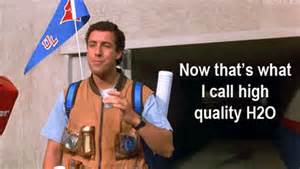We all know it is important to drink water, it’s a given that if you stop you will die. Proper hydration is about more than just surviving or getting by. It’s about making sure your body has enough fluids to function at its maximum potential. Your body uses water for numerous essential functions including regulating its temperature through sweat, lubricating joints, facilitating digestion, flushing out waste and carrying nutrients and minerals.
There is a difference between merely drinking water when you are thirsty and staying properly hydrated. Just like food is the fuel for our bodies, fluids are the oil that keep everything lubed and running smoothly.
First, let’s keep things simple. There are numerous signs of dehydration. But I want to focus on the two that are the easiest to observe and the most obvious. The first sign of dehydration is thirst. That’s pretty simple, when you get thirsty your body wants water. But, take it a step further, if you are getting thirsty regularly you are hydrating on a reactionary basis, and therefore you will be perpetually dehydrated. The second easy and obvious sign of dehydration is the color of your urine. Urine should be almost clear every time you urinate. Use this chart as a reference. Unless you are taking vitamin B or another vitamin or mineral that changes the color of you urine, if your pee is yellow you are dehydrated. Observing dark or yellow pee means you are even further behind on hydration then being thirsty and your body is seriously lacking fluids. The reason I only list these two symptoms is that you should never get past these points of dehydration. The moment you realize you are either thirsty or your urine is not clear, you need to hydrate right away to catch up, and get extra fluids to prolong and maintain hydration. Drinking enough fluids to catch up is not enough, plan ahead to stay hydrated.
So what is the big deal anyways? Why does being hydrated matter when we live in a society where water is only a short walk down the hall or a trip to the refrigerator away? Two things. First, its low hanging fruit as far as healthy habits go. Drinking water is easy and cheap, so why wouldn’t you if it is good for you? Once you make it a habit there is literally no downside risk other than maybe peeing more frequently. Think of healthy living as layering good habits on top of each other, proper hydration is just another one of those layers that is essential to a healthy body. Second, it will help your workouts. If you are dehydrated going in to a workout you are handicapping yourself, lower fluids levels lead to less blood volume and make the heart work harder to transport oxygen throughout the body. Exercise performance is impaired when the body experiences as little as a 2% drop in body weight from loss of fluids. In high intensity exercise the performance drop off can be as much as 45% when the body experiences a 2.5% drop in body weight due to dehydration. We workout for many reason, but mostly because the stimulus we apply to the body during exercise leads to a favorable adaptation by the body. Being dehydrated can lead to a drop off in performance that will keep you from realizing the full benefits of the workout. If you regularly workout without being properly hydrated you could be hindering your long term progress.
There are three main ways your body loses fluids. Sweat, respiration, and peeing. Sweat is the most obvious loss of fluids, but what is not obvious is that we sweat all the time, even while just sitting or sleeping, so keep in mind no matter what you are doing you are constantly losing fluids. I point this out to emphasize that if you are not proactive at staying hydrated you will eventually fall behind and become dehydrated. During sleep your body can lose as much as 2lbs of water from perspiration and respiration. Your lungs use water to function properly so on dry days you can lose as much a 3-4 cups of water just through breathing.
In addition to regular fluid consumption throughout the day it is important to hydrate before, during and after periods of elevated fluids loss. Especially sleeping and exercise. Drink a glass of water before bed and when you wake up in the morning. If you wake up during the night have a glass of water ready to drink then too. Drink at least 16oz of water an hour before a workout. Drink plenty while you are exercising and drink another 16oz over the next hour after as you cool down. If you are interested in learning your sweat rate while exercising to know exactly how many fluids you need to replace afterwards, use this formula.
Below are some recommendations on daily fluid intake, this is a good starting point but base your own consumption on the color of your pee and how frequently you feel thirsty.
Daily intake: ½ your body weight in ounces. I weight 185 so I should aim for 62.5 ounces or about half a gallon.
One hour of exercise: Consume an extra 20 ounces. On a workout day I should consume 82.5 ounces, a little less than ¾ of a gallon.



